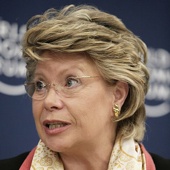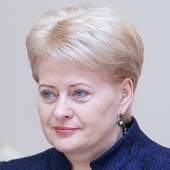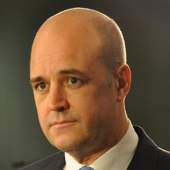EPP candidates for Commission President

In a previous post I analysed the likely candidates from the centre left PES for Commission President. Here I examine who the centre right EPP might put forward. It is worth bearing in mind that the nomination process depends on the outcome of the European Parliament elections, according to Article 17.7 TEU: “Taking into account the elections to the European Parliament… the European Council shall propose to the EP a candidate for President of the Commission”.
So who are the likely candidates?
 Donald Tusk [Wikipedia]
Donald Tusk [Wikipedia]
Current role: Prime Minister of Poland
The normalisation of relations between Poland and the EU institutions in recent years owes a lot to the work of Donald Tusk and his centre-right administration. Angela Merkel is even reported to be favourable to the idea that Tusk could become President of the European Commission. Tusk has been Prime Minister since 2007, so now might be a good time to seek a move to Brussels. The poor quality of his English, and that Poland is not a Eurozone country, might count against him.
 Viviane Reding [Wikipedia]
Viviane Reding [Wikipedia]
Current role: Vice President of the European Commission, and Commissioner for Justice, Fundamental Rights and Citizenship
Nationality: Luxembourg
There is nowhere else for Reding to go. Luxembourg is too big for her ego, and she has been a member of the Commission for three terms already. Issues such as mobile phone roaming charges, and efforts to get women on boards of companies in Europe show her political commitment. The question is while she is heavily rumoured in Brussels as a likely candidate, would anyone else actually want her? She is from a core Eurozone country, and knows the Brussels corridors of power well. However she is from a tiny country and has views that are not mainstream for the EPP.
 Dalia Grybauskaitė [Wikipedia]
Dalia Grybauskaitė [Wikipedia]
Current role: President of Lithuania
The ‘Iron Lady’ of the politics of the New Member States, Grybauskaitė is a former member of the European Commission (2004-2009) who has since been President of her country. Lithuania will also hold the Presidency of the Council of the EU in the second half of 2013, increasing her profile further. Her nationality (from a non-Eurozone country) could count against her, but she would be a solid, reassuring and reliable candidate, with experience of the highest levels of EU decision making from the Member State and Commission perspectives.
 José Manuel Barroso [Wikipedia]
José Manuel Barroso [Wikipedia]
Current role: President of the European Commission
Nationality: Portuguese
What, Barroso, again? EU politics watchers collectively groaned when Barroso refused to rule out a third term as President of the Commission. The Portuguese would be a case of better the devil you know. Always keen to find favour with the large Member States, and himself not strong enough to really challenge them, there would be little enthusiasm for his re-nomination. The ongoing Dalli scandal may eventually put an end to his chances.
 Fredrik Reinfeldt [Wikipedia]
Fredrik Reinfeldt [Wikipedia]
Current role: Prime Minister of Sweden
Sweden’s two-term Prime Minister has piloted his country through turbulent economic times relatively unscathed, but a 2014 election, and decreasing support for his coalition partners in his government, could mean the end of the road in national politics for him. He would be a good compromise candidate, and he is also one of the few allies of the UK. Sweden not being a member of the Eurozone would count against him.
 Christine Lagarde [Wikipedia]
Christine Lagarde [Wikipedia]
Current role: Managing Director of the IMF
Nationality: French
A former Finance Minister in France, Lagarde has been at the IMF since 2011. She has considerable international experience, and national political experience, and comes from a core Eurozone country. She would have to end her IMF position after only 3 years to take up the job, but her calm assurance and determined manner might make her a viable candidate.
Outsiders
Jyrki Katainen (Prime Minister of Finland), Enda Kenny (Taoiseach of Ireland), Michel Barnier (European Commissioner for Internal Market and Services), Valdis Dombrovskis (Prime Minister of Latvia).
If I’m missing anyone please do suggest names in the comments. Please note that there will be an additional follow-up post about possible cross party compromise candidates, and a further post about the position of High Rep for EU Foreign Policy.
[UPDATE 11.5.2013, 1430]: Lagarde and Dombrovskis added thanks to suggestions from Twitter.
| Posts about EU top candidates 2014 President of the Commission: EPP, PES, Others | President of the European Council | High Rep for EU Foreign Policy |
Image credits – all Creative Commons / Sharealike licensed
Donald Tusk by President of the European Council | Viviane Reding by World Economic Forum | Dalia Grybauskaitė by Saeima | José Manuel Barroso by World Economic Forum | Fredrik Reinfeldt by SWE EUPress | Christine Lagarde by World Bank Photo Collection
I’m guessing that now that Luxembourg’s about to get a liberal-socialist-green coalition, Reding’s definitely out of the picture.
NO please!! no Reading never!! I prefere anyone other than her!! The socialist woman of the EPP.
There is one guy: a talented communicator, nominally a socialist but in reality a centrist Christian Democrat, well known for his solid European credentials but also a firm Atlanticist, from a Northern country but openly Catholic, and unlike most nominees, a household name. Step forward Tony Blair.
I would be in favor of Christine Lagarde as the next President of the European Commission.
Especially after reading this excellent WSJ interview with her:
http://online.wsj.com/article/SB10001424127887324266904578463203734015058.html?mod=WSJ_WSJMoney
Two more posts in this series:
High Rep
President of the European Council
I applaud Jon Worth for animating the discussion:
http://grahnlaw.blogs.fi/2013/05/17/the-real-engine-of-european-integration-jon-worth-16002696/
One small point, we are getting the nitty-gritty in the same level as choosing the members of the Swiss Federal Council, i.e. there must a certain number of this and that. 😀
If the EPP gets the Commission presidency (Barroso/Reding/Tusk/whomever) then it won’t get the VP/HR job. Party balance trumps gender balance, sad as that sounds. Also, the VP/HR pick is a secondary choice that flows from the Commission presidency pick – not the other way around.
Plus, Sikorski is outside the mainstream in terms of foreign policy views. If the EPP gets the job, it’ll be Carl Bildt.
Anders Fogh Rasmussen will indeed be looking for a job as his NATO stint ends in 2014 but difficult to see who will nominate him. (grateful for small mercies as the last thing the EU needs now is to get bogged down in military matters).
As last time I expect a clamour for a balanced gender split between the top two/three posts. Surely inconcievable that Council president, Commission president and VP (let alone EP president) will all be men. If Sikorski becomes front runner for VP/HR EEAS then Redings chances increase but I can’t see heads of government wanting a EC president with any ideas of their own: safe adminstrator leaving political issues to Council president.
Lagarde still has legal troubles (although things may become clearer after her hearing on 23 May), but is Hollande going to back a UMP member, who’s not on the same page as him re austerity? If others want her, does he not look weak, as Gordon Brown did on being bounced into Ashton in the HR job?
Given the package of posts up for grabs, the EP will doubtless try to push its own candidate for HR too, but the European Council will surely push back to defned its own prerogative, risking a messy inter-institutional confrontation. The EP will need a good rise in turn-out and a strong majority if it’s to get anywhere in that scenario.
PS will Berlusconi be back in the Palazzo Chigi by the time of Italy’s Council presidency in July 2014, when all this has to be sorted?
Lagarde isn’t going to run – she could be a last-minute candidate proposed by the European Council for one of the two presidencies (Van Rompuy’s job or Barroso’s) should there be a lack of agreement on a name for either but she’s not going to step down from her IMF gig to run for the Commission presidency.
HR will be a consolation prize to whichever of the two big parties doesn’t get the Commission presidency (assuming there isn’t a deal to split the European Council and Commission presidencies between the EPP and the S&D – I assume, honestly, that the EPP will probably get both). So assuming the EPP holds onto its position as biggest group in the EP and gets the two top jobs, the HR position will go to Fabius, d’Alema, Bonino or some other reasonably prominent centre-left politician. I can’t see ALDE getting it (plus, Rasmussen, really?)
@Martin – personally I would not want Reding either
@Ralf – calm down! Other parties will be covered in subsequent posts! 🙂
@Till / @Philippe – generally agree re. Reinfeldt, but it’s really a long shot for him to win again in Sweden…
@Tomass – thanks for the comment, and the views on Dombrovskis. He sure needs to be brought into the calculation. However while your line “So basically the top candidates are either from outside the Eurozone or bureaucrats” might seem to be true, I have not drawn up the list on that basis – it was done on the basis of the names that seemed to be mentioned in Brussels, and an analysis of the top EPP politicians who may be available.
@Patricia – we don’t know how it will work. You might prove to be right, but we don’t know.
Also it was pointed out to me on Twitter that Grybauskaitė was elected as an independent as President of Lithuania. She was however backed by the Conservatives, hence why I include her here.
Jean-Pierre Raffarin, just for this: http://www.youtube.com/watch?v=ORj3wImDhLk
The Treaty promises to take into account ‘the elections to the European Parliament’ (of 750-or-so MEPs, by a mere 40 % of the electorate). Interesting choice of words. If the Treaty had said, “takes into account ‘the European elections'” then it’d have to take account of the silent majority that is too disinterested, too disgusted and too disillusioned. Clever foxes, those drafters. The future President can shrug off Euroscepsis as if it hardly exists, as the Europhile belief will once again be grocely overrepresented among those effectively ‘elected to the European Parliament’.
So basically the top candidates are either from outside the Eurozone or bureaucrats. Interesting analysis. What qualities is it exactly that make for instance Tusk or Reding superior to other candidates to run the EU executive body? I assume that a future EU commision president will have significant role to play guiding Europe through its economic crisis and thereafter solving the structural issues that wait on the other side of it. There I personally think that e EC president should live up to the following criteria:
1. Experience in crises resolution (and here I mean economic crises, trying to push through a directive on women ratios on European boards does not count)
2. Taking into account the pan-European ambitions of the 2014 EU elections and its attempt to “elect” a commision president, the party candidates should be of some substance. Good language skills would therefore be a prerequisite. Also the candidate should have won elections and be able to change public opinions. The later might prove necessary as many unpopular decisions will inevitably have to be taken.
3. The candidtae should be from a core EU country, preferably one that meets the Maastricht criteria. That the candidate would be from a non-euro country seems unlikely.
To sum up, I believe most of the candidates above are unlikely to secure the EPP candidacy except maybe Lagarde. Two interesting names did, however, come up in the “outsiders” section, namely Jurki Katainen and Valdis Dombrovskis. I personally believe that these two persons are in fact the top contenders for the EPP bid. Being Latvian, I feel it is my duty to make a case for Dombrovskis:
The latvian economy experienced a severe recession, in fact the deepest in the world, with a GDP fall of 25% in the period of 2008-2009. International confidence in Latvia was at an all time low as the incumbent government fell and economists such Paul Krugman called Latvia the new Argentina. Amidst this turmoil Valdis Dombrovskis emerged, bravely communicating his economic policy (one that accounted for an economic adjustment equal to 18% of GDP in its first year on; a staggering and historically unprecedented figure). Due to its fixed exchange rate Latvia was unable to devalue, just like Eurozone countries like Greece and Spain. Yet Latvia has emerged as the fastest growing economy in the EU (5.5% in 2012), it’s credit rating has been upgraded numerous times now since 2009and unemployment is steadily declining from its peak in 2009. Further more Dombrovskis is currently preceding over his third government and his latvias longest serving PM. Finally, Latvia joins Luxembourg, Finland and Estonia as the only countries that fulfill the Maastricht criteria. Furthermore Latvia will join the Eurozone 01.01.2014 giving the Eurozone a much needed confidence boost and also leaving Dombrovskis as the one who lead Latvia into the Eurozone. Latvia elections are scheduled in 2014. It would be unlikely that Dombrovskis stays for a fourth government term. A few links to support some of what I said:
http://www.baltic-course.com/eng/baltic_states/?doc=72505
http://www.bloomberg.com/news/2013-05-02/latvia-poised-to-join-trio-meeting-euro-rules-chart-of-the-day.html
Like Till-CH I seriously doubt Fredrik Reinfelt as domestic politics is a much bigger agenda for him. He needs to get the Alliansen together due to upcoming 2014 elections as both of the smaller parties of the Centre Party and Christian Democrats are predicted to wipeout of the Riksdagen, together with the growth of the Sweden Democrats he would need serious have to put something for he to be EC president.
I think either Tusk or Grybauskaitė
Donald Tusk may have good chances to get the nomination, despite the fact that Poland is not in the eurozone. Poland is not in the eurozone because it does not meet the Maastricht criteria, and not because a political majority doesn’t want to join.
Frederik Reinfeldt is in a more controversial situation. He has personally campaigned in favour of the euro in 2003, but recognised the legitimacy of the Swedish de facto opt out as a Prime Minister and did not give a high priority to the issue. Since most of EPP constituent parties will be challenged by parties promoting the dissolution of the monetary union or at least a national opt-out, it is unlikely that Reinfeldt could be the best candidate to promote a pro-euro agenda.
That being said, the personal issue is not really crucial. No party will have an absolute majority in the European Parliament, and one could also expect that the four large pro-European groups (EPP, S&D, ALDE and Greens/EFA) will loose some of their seats to more eurosceptic groups. It would be more interesting to know what the EPP proposes on three relevant points on the agenda:
– EU-US FTA: How should a possible EU-US FTA look like?
– EU budget: How should the EU budget be financed and how should these resources be spent?
– Cameron agenda: Does the EPP agree with Cameron’s proposals on how to reset the EU priorites?
These issues are clearly on the table and will need to be discussed during the next term of the European Parliament. If the incoming MEPs fail to approach these issues in an inclusive way during the campaign, their legitimacy may be further undermined.
Please, please, anyone but Reading. I would rather have Barroso back than her.
http://martinned.ideasoneurope.eu/2012/11/22/women-quotas-2/
The European Greens have been discussing their nomination process and the liberal ALDE party can be expected to field a candidate. Some of the AECR nationalist conservatives sound like they’re preparing the ground for Vaclav Klaus, so there will be a lot to speculate about during the next months.